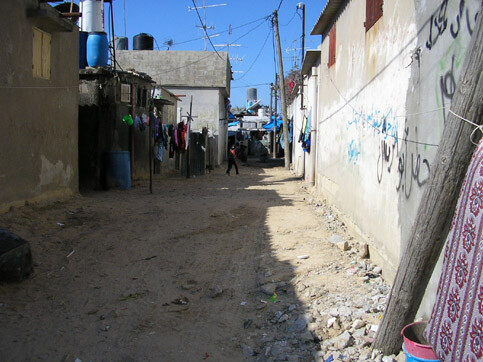European Commission Humanitarian Aid Office (ECHO) 17 February 2005

Increasing numbers of Palestinians are being deprived of access to healthcare, education, water resources and the means to earn a living. (Arjan El Fassed)
The humanitarian situation in the occupied Palestinian territories must not be overshadowed by the latest political developments and requires renewed assistance by the donors’ community, warned Cees Wittebrood, Head of the Middle East and Mediterranean countries of the European Commission’s humanitarian aid department (ECHO).
The European Commission is one of the largest donors of humanitarian aid to the Palestinian population, with €155 million of assistance provided since the start of the second Intifada in 2000. After more than four years of conflict, living standards in the occupied territories have dramatically deteriorated. According to the World Bank, half of the population lives below the poverty line on less than $2 (€1.54) per day and 600,000 people cannot afford to meet their basic needs in food, shelter and clothing.
On a week-long visit to the region, Mr. Wittebrood said that “progress in the political negotiations is encouraging and deserves strong support from the European Union and the international community. We must continue to insist, however, that International Humanitarian Law is respected in the occupied Palestinian territories.”
“In particular, we look forward to more freedom of movement for Palestinian people and goods, including medical personnel and food supplies, as well as for aid agencies so that they can deliver relief in a timely and efficient manner to those most in needs,” he explained. ECHO estimated in 2004 that security and bureaucratic obstacles in the occupied territories contributed to increase the cost of humanitarian operations by 20 percent.
Mr. Wittebrood called on international aid donors “to continue to help meet the urgent humanitarian needs of large segments of the Palestinian population.” He announced that ECHO will propose to allocate a further €34 million for assisting Palestinians across the region in 2005, of which almost €30 million as of next May. “More could be made available if the humanitarian needs grow bigger,” the Commission’s official added. ECHO will pay particular attention as to how the humanitarian situation in the Gaza Strip develops if the Israeli’s withdrawal plan is implemented.
The largest share (30 per cent) of the proposed €30 million aid package will support the creation of employment opportunities in the territories. Other priorities are expected to include food security, water and sanitation, health care and psychosocial support to vulnerable groups such as youth. Half of the assistance will be distributed through non-governmental organisations, and the other half through United Nations specialised agencies and the International Committee of the Red Cross.
Mr. Wittebrood deplored the growing humanitarian impact of the “security barrier”, after seeing by himself areas and meeting with communities affected by its construction in East-Jerusalem, Bethlehem and the south of the West Bank. “As construction continues apace, increasing numbers of Palestinians are being deprived of access to healthcare, education, water resources and the means to earn a living.” ECHO will keep on funding food aid, health care and job opportunities for those most affected.
“The humanitarian needs of Palestinian refugees living in neighbouring countries must not be forgotten either,” Cees Wittebrood finally warned, regretting that these had so far been largely neglected by aid agencies and most international donors. ECHO will strengthen its assistance to these refugees, he said, especially in Lebanon where they face particularly harsh conditions.
The assistance to the Palestinian population currently represents ECHO’s fourth biggest operation in the world after tsunami-hit South-Asia, Darfur (Sudan), and the Democratic Republic of Congo. It amounted to €37.35 million in 2004 or 8.5 per cent of the ECHO-funded aid worldwide that year.
More Information
Related Links